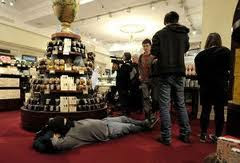 The death of a street newspaper vendor following a vicious assault by police shows how Britain's repressive state operates.
The death of a street newspaper vendor following a vicious assault by police shows how Britain's repressive state operates.
On 1 April 2009 a diverse crowd of people gathered in the centre of London to protest at the G20 summit meeting of world leaders. Most were peaceful if noisy; a tiny minority were there to commit acts of vandalism. But overall, the commercial district of London came to resemble a street carnival of clowns, jugglers, hippies and ordinary people taking to the street to make a point.
Sometime after seven in the evening news filtered through of a death. The police soon made it clear what had happened: a newspaper vendor in his late forties, Ian Tomlinson, uninvolved in the demonstration but surrounded by black-clad anarchists, had collapsed: a heart attack was suspected. Police medics rushed to his aid but were met with a barrage of bottles hindering their efforts. News outlets aired the story.
In the following days several witnesses challenged the police account, but the police complaints authority (IPCC) felt safe in dismissing them and endorsed the police version of events. A post mortem revealed that Tomlinson had indeed died of a heart attack.
A week later conclusive evidence of what had really happened emerged from an unlikely source: the mobile phone footage of a New York hedge fund manager. The film showed Tomlinson walking along, hands in his pockets away from a line of police. Suddenly one of them, Officer Simon Harwood, dressed in a black balaclava partially obscuring his face and with his police identification number removed from his clothing, stepped forward. He truncheoned Tomlinson on the legs and then pushed him to the ground. Stunned, Tomlinson struggled into a sitting position and was assisted to his feet by a demonstrator. Far from helping, the line of police looked on or through Tomlinson as if he were not a person in distress at all. A dazed Tomlinson stumbled out of sight of the camera and minutes later he collapsed and died.
Two further post mortems by independent doctors established that Tomlinson had died from internal bleeding consistent with being thrown to the ground. The first was made public immediately; the second only months later.
The police behaviour on the 1 April 2009 against largely peaceful civilian demonstrators was almost certainly the most gratuitously violent in modern times. Little, if any, attempt was made to distinguish between people committing crimes and those simply attending and protesting, or in Tomlinson’s case by-standers caught up in the event. Forced into street holding pens (popularly called ‘kettles’) with no means of escape, men and women were punched, kicked, hit with batons and shields and bitten by police dogs. In attacking Tomlinson Officer Harwood’s behaviour was probably no worse than that of many of his colleagues. Harwood was unlucky for two reasons: Tomlinson died and the assault was filmed.
Some argue that the police went berserk in London on 1 April 2009. That is not the case: had they done so many tens of people would have died; in fact neither Harwood nor the police in general wanted to kill anyone. The police operation, led by a Commander Broadbent, certainly allowed officers to humiliate lawful protesters and beat them in a non life-threatening way. And to ensure that individual officers were not accountable for their actions, they were permitted to wear balaclavas and a blind eye was turned to their removal of identification badges on their uniforms. Broadbent felt, not without good reason, that the government, courts and media would side with him and his officers even when their actions constituted illegal assaults on innocent people.
The Tomlinson death presented a problem. State disregard for police violence at public order events normally depends on two conditions: first, that the police don’t kill or seriously injure people and second that the details of who was at fault in any particular confrontation remained murky. Tomlinson’s death broke both these conditions. Justice in a state supposedly governed by the rule of law now demanded that charges of assault and (given that Tomlinson had died as a consequence of a serious assault) manslaughter should be pressed against Harwood.
The Crown Prosecution Service took fifteen months to come a decision; it decided in the end not to prosecute Officer Harwood. It’s reasons were transparently dishonest. Manslaughter charges could not be brought, it said, because of the conflicting post mortem results. Yet the results of the first police-instigated post mortem had been rejected by two independent doctors; and even if Tomlinson had died from a heart attack, it was impossible to argue that his experience at the hands of Officer Harwood had not contributed to his death. In addition it was by now apparent that the police had summoned the first pathologist, Dr Freddy Patel, because he could be relied on to give the police the results they wanted at the time (i.e. that Tomlinson had died of a heart attack brought on by being surrounded by black clad anarchists). And to finally demolish the credibility of the police-instigated post mortem it was revealed that Dr Patel was later stuck off the list of approved Home Office pathologists on account of other incidents of misconduct undertaken in support of the police.
And what of the assault charge? Well, it was time-barred because it had to brought within six months and the prosecution service had taken fifteen to reach its decision.
Some have argued that the institutions of the state (prosecution service, courts, etc.) will always support the police when they are in conflict with ordinary people, so the decision not to prosecute Harwood is no surprise. There is much precedent to support this argument, but it should be pointed out that by not prosecuting Harwood, the police and prosecution services suffered a loss of legitimacy in the eyes of all those who cared to look - not just people on the left. It would have been far more beneficial to the police in the long run to have claimed Harwood was a ‘bad apple in the barrel’ and to have sent him to court.
The refusal of the prosecution service to charge Harwood seems to have its cause elsewhere. The evidence against Harwood was rock solid and a majority of people wanted and expected him to be charged with at least assault. What the Crown Prosecution Service was saying in its decision is that WE the state decide prosecutions, irrespective of the evidence and the demands of justice. You, the people, can collect all the evidence you like and argue as logically as you want, but is WE who retain the power.
The Meaning of the Tomlinson Case
The meaning of all this is not, as some have suggested, that the police have been given a carte blanche to assault and kill at random. Officer Harwood, even if he never faces a criminal trial, has not been given a pat on the back but faced interrogation and a possible charges for manslaughter for over a year. No police officer could be sure that if these events were repeated in the future he would be treated so leniently. The meaning of the Tomlinson case is more subtle.
Tomlinson demonstrates that the institutions of force and law (police, police complaints authority, prosecution service) cannot be held to popular legal account. They are corrupt, not in the sense that the people working in those institutions take money to mis-perform their duties, but that they brazenly disregard the purpose for which they exist and citizens have little or no form of address against their maladministration. The police lie and organise ‘bent’ autopsies; the police complaints authority act as puppets of the police. The prosecution service obstructs and drags its feet and gives wholly dishonest reasons for failing to prosecute. Such is the nature of the institutions of the British state today.
Also noticeable is the near total silence of British politicians; they seem quite relaxed with a society in which a police officer truncheons a passer-by, hurls him to the ground and to his death, but then goes unpunished. The maladministration of the police, the police complaints authority and the prosecution service leave them equally untroubled.
Tomlinson has divided effects on state power. On the one hand the case has undoubtedly undermined trust in the police; the misconduct is too clear-cut for anyone who cares to notice. On the other, the state has reinforced its unaccountable power over the people in that even when there is rock-solid evidence of state misconduct, citizens have no right to remedy. People are subject to the state; the state is not accountable to the people who live within it.
Postscript: Following the urban riots of 2011 when public sympathy with the police had at least been partially restored, P.C. Harwood was tried for manslaughter. The severity of the charge and the then prevailing public attitude, if nothing else, meant that a divided jury failed to convict him. He was later dismissed from the police.





